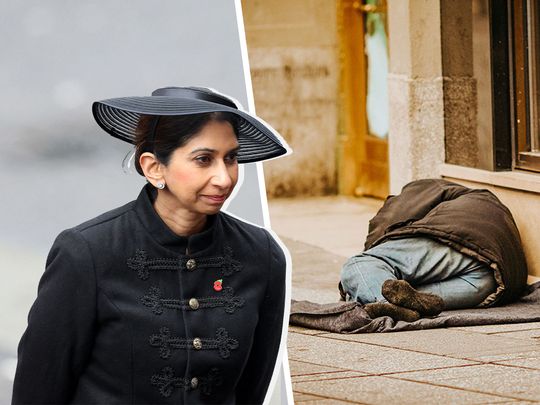
A few days ago, I watched a Spanish military cargo plane come and go from Arrecife airport on the Spanish Canary Island of Lanzarote and pondered on the nature of fate.
Fate, you see, is beyond our control.
Fate had been on my mind because of a unique real estate listing I came across. Just up the road from the airport, about 10 kilometres as the bird flies, there is a marvellous and opulent mansion up for sale.
If you have about €7.5 million in spare change — I don’t — then a little bit of history and pop culture can be yours. And it too is intertwined with fate.
Nestled in a 7,000 metre sq complex built out of a volcanic quarry, the mansion was named Casa Omar Sharif because of its apparent connection to the Hollywood star. Sharif, who was catapulted to international stardom in the title role of Doctor Zhivago, is said to have fallen in love with the property while he was on the island filming The Mysterious Island in 1973 and bought it on the spot.
A matter of life and death
But fate intervened. Sharif only owned the house for a few days before he lost it in a game of bridge to an Englishman called Sam Benady, the property developer responsible for the mansion’s construction. Sharif had a worldwide reputation as an excellent bridge player but did not realise that Benady was himself the European bridge champion. Oops!
On Monday, fate intervened in a most peculiar war, with Prime Minister Rishi Sunak tapping former PM and retired Conservative figurehead David Cameron, to become the UK’s next foreign secretary.
Cameron is, of course, widely experienced, and he too knows how fate can be cruel. That disastrous Brexit referendum was his doing. And his undoing.
There is so much about fate that we cannot control. We are products of our history and geography, our environment and our culture. And as someone who has spent most of the past four decades around the world, I cannot comprehend for a second why we lack compassion and caring for those born in less fortunate circumstances than our own.
Back to that military plane. It’s part of an increased presence on the Canary Islands — Morocco is some 125 kms away over the horizon to the east.
For refugees who take to rickety boats and set their sights on a new life in Europe by hoping to make it to the Canary Islands, fate is a matter of life and death.
It’s not yet the middle of November and so far this year, more than 32,000 refugees have made the perilous cross from West Africa. That figure grows by the day and only includes those who were successful. Who knows how many didn’t make it. Fate.
I cannot imagine for one minute being so desperate that I would entrust my life onto a crowded small boat and heading out into the ocean. But then again, because of history and geography, circumstance and birth, I have never faced the political, social, religious or natural calamities that would make that choice the only viable option.
This notion weighs heavy on my mind as I watch events unfold in Gaza. Or in Ukraine. Or anywhere else where life or death is so intertwined with fate, with circumstance, with history and geography. And in my mind, those who flee catastrophe and crisis, disaster and danger, deserve to be treated with respect.
The hardest thing to accept
For me, lucky enough to live part of the year in Spain, part in the UK, I am saddened by the disparity in attitudes that greets refugee arrivals in both countries.
In Britain? Sadly, there is a meanness of spirit that is missing. Compassion seems to be a thing of the past. It began to fade when Camberon was PM.
That word fate came to mind when I arrived back in Britain from my weeks away in Lanzarote.
Suella Braverman, the UK’s erstwhile Home Secretary, the minister responsible before Monday’s cabinet reshuffle for law and order, made my blood boil. Last week, she took to the airwaves, describing homelessness as “a lifestyle choice” she disparaged too charities and church groups that help the homeless and provide tents so that at least there is some form of a roof over their heads while they eke out an existence on the very edge of British society.
Under motorways, in woods, beside railway verges, there are those far less fortunate than ourselves who dream of a better future — and do so under the canvas of those tents.
Sunak was left with little choice other than to dismiss her on Monday for her open defiance of his authority in pushing her mean-spirited agenda against those who support the rights of Palestinian or dare call for a cessation of violence in the Gaza Strip
On Wednesday, the UK’s Supreme Court will rule on the legality of Braverman’s ill-advised policy that would see refugees to Britain — 43,000 came in 2022 — shipped off to Rwanda to be processed.
But here’s the hardest thing to accept. There are now more refugees living around the world than at any other point in our collective history. And at a time when more help than ever is needed, too many governments, too many people in leadership, have become devoid of humanity. And yes, Suella Braverman is on that list. She is gone now. Her influence, however, will remain.
My mother, long gone, used to remind her four children: “But for fate, there go I”. That is an expression that sticks in my mind and is a mantra for life.
It’s just a pity that so many more of us don’t live by those words. And that, in the words of Suella Braverman, “is a lifestyle choice”.








